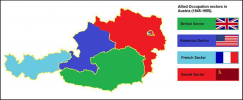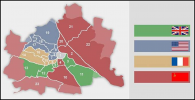AlbertBeale
Established Member
Also, Berlin was technically two capitals until 1990; East Berlin being the capital of the German Democratic Republic and West Berlin being its own distinct political entity from the Federal Republic of Germany. The latter's residents were exempt from Bundeswehr conscription for example.
mods note - split from this thread:
Is Berlin Hbf the capital city station with the most direct trains to other capitals?
This weekend I will travel from Stockholm to Oslo on the first direct train since March 2020. So, along with Snälltåget's (seasonal) night train to Germany, Stockholm now has direct trains to three other capital cities (Oslo, Copenhagen and Berlin). But which single railway station in a...
www.railforums.co.uk
West Berlin duing that era isn't the only such "anomaly" - the Åland Islands, between Sweden and Finland, are part of Finland but with a special status (such as Swedish being the only official language, whereas in the rest of Finland people are taught both Finnish and Swedish); as a result of the treaty agreeing that it was part of Finland (the islands having been claimed by about 5 different Baltic powers) it was demilitarised. Because of this, Finnish conscription laws don't apply there.
Partly because of this, both Berlin and Åland have been a popular venue for international pacifist meetings.
Last edited by a moderator:



